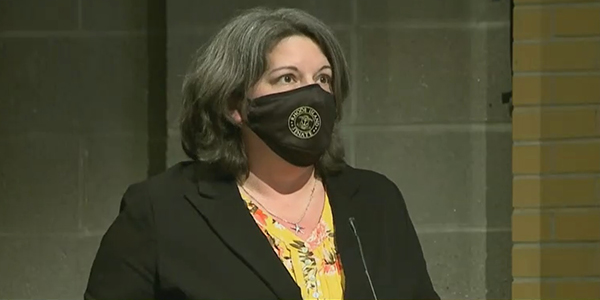The Rhode Island Senate on Tuesday passed a bill that would strengthen the state’s emission-reduction targets and make them legally binding.
The Act on Climate (Senate Bill 87A), passed by a vote of 33-4, includes a requirement that state-level plans for meeting emissions reductions provide an equitable transition for environmental justice communities.
“The increasing disruptions to ordinary life that climate change brings with it, including floods, droughts, wildfires and instability in the food system, hit the most vulnerable first and hit them hardest,” Sen. Meghan Kallman (D), a co-sponsor of the bill, said on the Senate floor. Building infrastructure and decreasing emissions are important from a climate perspective, but those actions also will “start to address the interlocking problems that exist across society,” Kallman said.
As passed, the bill updates the 2014 Resilient Rhode Island Act by advancing two emission-reduction targets by five years. A 45% reduction below 1990 levels by 2035 would be set to 2030, and an 80% reduction below 1990 levels by 2045 would be set to 2040. It would also add a net-zero emissions target for 2050.
Beginning in 2025, the Rhode Island Executive Climate Change Coordinating Council would have to submit a plan every five years to the governor and legislature on how to meet those targets.
“The bill introduces transparency into the state’s planning process for emissions reductions,” said Sen. Dawn Euer (D), another co-sponsor. “All of us in Rhode Island will be able to comment on these plans, and the council will address feedback through its advisory bodies.”
Euer said that a public dashboard to track emissions and sources of energy would add another layer of visibility and “foster an equitable transition.”
The state’s emissions-reduction plan would also need to develop programs to “recruit, train and retain women, people of color, indigenous people, veterans, formerly incarcerated people and people living with disabilities in jobs related to the clean energy economy,” Euer said.
Residents, organizations and the Rhode Island attorney general would be able to bring a case before the state Superior Court for failing to follow the climate plan or emission-reduction targets established by the act.
“If the state fails to follow the law, a court can enforce it,” Euer said. “This accountability is absolutely necessary to ensure we meet our reduction targets.”
The bill was considered by the House Environment and Natural Resources Committee (House Bill 5445) in February and held for further study. The committee will consider the bill again on Thursday.



